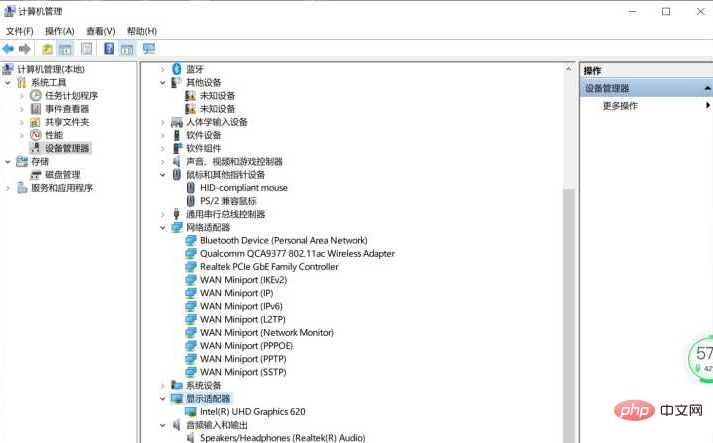
A driver is a special program that enables a computer to communicate with a device; it creates an interface for communication between hardware and hardware, or between hardware and software, through the bus on the motherboard or other communication subsystems and hardware. A connection mechanism that makes data exchange on hardware devices possible. The driver is equivalent to the interface of the hardware. Only through this interface can the operating system control the work of the hardware device; therefore, the driver is likened to the "soul of the hardware", "the master of the hardware", and "the bridge between the hardware and the system" wait.

The operating environment of this tutorial: Windows 7 system, Dell G3 computer.
The driver (Device Driver) is called "device driver". It is a special program that allows the computer and the device to communicate. It is a program that allows high-level (High level) computer software (computer software) to communicate with hardware ( Hardware) interactive program, this program creates an interface for communication between hardware and hardware, or hardware and software, and forms a mechanism to connect to the hardware through the bus on the motherboard or other communication subsystem. Such a mechanism Makes data exchange on hardware devices possible.
The driver is equivalent to the hardware interface. Only through this interface can the operating system control the work of the hardware device. If the driver of a certain device is not installed correctly, it will not work properly. Therefore, the driver has been compared to the "soul of the hardware", "the master of the hardware", "the bridge between the hardware and the system", etc.
Drivers play a very important role in the system. Generally, after the operating system is installed, the first thing to do is to install the drivers for the hardware devices. However, in most cases, we do not need to install drivers for all hardware devices. For example, hard disks, monitors, optical drives, etc. do not need to install drivers, but graphics cards, sound cards, scanners, cameras, Modems, etc. need to install drivers. .

The device driver is used to inform the operating system of the functions of the hardware itself and complete the interaction between the electronic signals of the hardware device and the high-level programming language of the operating system and software. translate. Device drivers usually account for more than 70% of the operating system kernel source code, and the update and maintenance of device drivers often involve more than 35% of source code modifications. Therefore, the device driver and the remaining parts of the operating system kernel are constantly changing. Consistency is a difficult problem in operating system kernel development.
When the operating system needs to use certain hardware, such as asking the sound card to play music, it will first send the corresponding instructions to the sound card driver. After the sound card driver receives it, it will immediately translate it into a sound card that can understand it. The electronic signal commands the sound card to play music.
So simply put, the driver provides an interface from the hardware to the operating system and coordinates the relationship between the two. Because the driver plays such an important role, people call it "the driver is the hardware "The soul" and "the master of the hardware", and the driver is also vividly called the "bridge between the hardware and the system". A driver is a small piece of code added to the operating system that contains information about a hardware device so that the computer can communicate with the device. Drivers are configuration files written by hardware manufacturers based on the operating system. It can be said that without drivers, the hardware in the computer cannot work. Different operating systems have different hardware drivers. In order to ensure the compatibility of the hardware and enhance the functions of the hardware, various hardware manufacturers will continue to upgrade the drivers. For example: Nvidia graphics card chip company will upgrade the graphics card driver 2-3 times a month on average. Drivers are part of the hardware and are an indispensable and important component when you install new hardware. Whenever you install a hardware device that does not originally belong to your computer, the system will ask you to install a driver to connect the new hardware to the computer system. The driver plays the role of communication, telling the computer system the functions of the hardware, and also conveys the system instructions to the hardware to let it start working.
Application of driver
Due to common differences in hardware and operating systems, there are different methods of driver. Used for:
Printer
Graphics card
Network card
Sound card
Different types of buses
Different types of Low-bandwidth input/output bus (such as pointing devices: mouse, keyboard, USB, etc.)
Hard drive bus (ATA, SCSI)
Implement support for different file systems
Implement support for scanners and digital cameras
Common levels of abstraction of drivers:
In terms of hardware layer:
Interfacing directly
Use some higher-level interface (e.g. video BIOS)
Use another low-level driver (e.g. file system driver to use disk Driver)
Simulates hardware work
In terms of software layer:
Allows the operating system to directly access hardware resources
Implementation only Its primitives
Implements an interface to non-driver software (such as TWAIN)
Implements a higher-level language, such as PostScript
Virtual device driver Program
There is a special kind of driver called virtual device driver, which can be used in virtualization environments. For example, if a DOS program wants to run on the Windows platform, it must use This kind of virtual device driver, such as VMware, is a kind of "virtual PC" software that can run two or more Windows, DOS, and LINUX systems on one machine at the same time. VMWare truly realizes "simultaneity" Run, multiple operating systems on the main system's platform, and switching is as easy as standard Windows applications.
For more related knowledge, please visit theFAQcolumn!
The above is the detailed content of What is the driver. For more information, please follow other related articles on the PHP Chinese website!